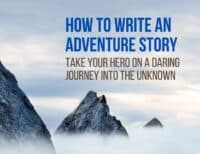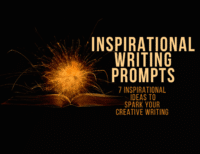Are you looking for a writing challenge that really tests your writing skills? Something that pushes your writing process beyond national novel writing month (although trying out NaNoWriMo is a good challenge to face)?

As a writer, you’ve probably heard this question: “What’s your genre?” Or maybe you’ve been asked, “What is your book about?”
As writers, we tend to find a creative “happy place” and stay inside three boxes: medium, form, and genre. This allows us to find a consistent voice and target our work towards ideal readers.
But staying inside these boxes without any deviation can have major drawbacks that threaten the quality of your writing, and the joy of writing itself.
In order to stay sharp, writers need challenges to keep their creative juices alive and well.
And whether or not these challenges are daily writing challenges or something you find on social media without even looking for them, it's important that, as a writing habit, we tackle them head on every once in a while.
We only become better writers when we step outside our comfort zones.
These three writing challenges will test and strengthen your writing skills.
Why You Need to Challenge Yourself
One drawback to not challenging ourselves with different writing projects or writing goals is complacency.
When we write the same thing in the same way for too long, the work becomes boring, which means all that hard work probably results in stories that are dull to read.
Another drawback is a lack of imagination.
I mentioned that there are three common boxes: medium (what you write on), form (how poetic your writing sounds), and genre (what norms your writing follows).
By staying inside these three lines, your work might be doomed to repeat itself or fall victim to old clichés.
Just like beginning a new exercise routine, or adding different lifts or stretches to your regimen, challenging yourself with new writing tasks will cause you to grow in valuable and meaningful ways.
Because of this, it's likely you'll start to recognize when you're stuck in your writing comfort zone, and why too much of the same medium, form, and genre leads to unhappy places, like writer's block and burnout.
If you want to become a life long writer, it's important that you embrace new challenge. This true for new writers working on a book for the first time or full-time writers plotting out their next manuscript.
We all need to challenge ourselves if we want to grow our craft.
My Writing Challenge: Host a Murder
I took up such a challenge several years ago when some friends asked me to write a murder mystery dinner party.
I accepted the challenge with smarmy arrogance. I had recently participated in such a mystery dinner party that my friends bought out of a box, and found the experience disappointing and the “Whodunit?” reveal frustratingly complex.
I assumed I could do better.
I was quickly humbled. Creating a murder mystery dinner party is complex.
First, it’s not a typical story or book. It’s actually eight stories (because I created eight characters) told in small chunks based on courses in a meal.
But I didn’t stop there.
I added to the complexity by putting pieces of evidence in tiny envelopes that were taped to the inside of each character’s booklet. Then I decided to have a false ending, where the first killer is only a pawn of the real killer, who gets the chance to secretly kill off another character before dessert!
(When my friends hosted this, everything went well—until the uber-killer decided to knock off a dinner guest who is a great actress, who scared the heck out of her husband by pretending to choke to death!)
Challenge and Reward
Looking back, I’m thankful that I took on this creative challenge because it forced me out of my comfy writer’s box.
First, I had to write in a different form than my usual narrative prose. A murder mystery dinner game has to function as both a story and a complicated role-playing game. The materials I wrote—especially the host’s book—took on a number of different voices and styles, including everything from an instruction manual to a sales pitch.
Second, I had to write in a different medium than the typical page. Now I was writing backstory into booklets and little pieces of evidence. Suddenly the story was hidden in a receipt, or a text chain, rather than pages and paragraphs!
And third, I had to write in a different genre than I usually do. Not only was this a murder mystery, but I made it campy, calling it The Last Lap of Burt Pabsthardt and setting it in a fictionalized version of NASCAR. Think CLUE meets Talladega Nights.
By stepping outside my comfort zone in all three of these typically well-established areas, I was forced to stretch, flex, and grow.
And if you take on your own kind of challenge, I think you will too.
Your Turn: 3 Creative Writing Challenges
Ready to take on the challenge? Here are three writing challenges that will help you write outside the box and become a stronger, more creative storyteller.
Challenge 1: Write in a different medium
Think of literary medium as “delivery vehicle.”
If you write stories, your vehicle is the page (printed or web). If you make art, your medium can be oil on canvas, scraps of metal, or bits of food.
So how do you change the “delivery vehicle” for your writing?
We consume writing all the time that isn’t on the internet or a printed page. We just don’t notice.
Think posters, flyers, and signage. Think infographics and Pinterest pins. Think greeting cards, games, decorations, and other forms of “word art.”
Think of the stage and the screen.
When you decide to tell a story in a different medium, new creative muscles are forming.
You begin to see your story in a new, living way.
You also begin to think in new ways about your reader. “How will this look?” you think, which is a strange thought for a literary artist to have.
But it’s a different and powerful thought to have, and it will stretch your skills in ways you can’t predict.
Writing Challenge: Take an existing story or chapter you’ve written and retell it in a new medium, like a play, infographic, or game.
Finally, take some time to reflect on how this writing challenge impacted your writing craft.
Did it make you consider new conflicts or characters you could add to your story or chapter? Did it kickstart ideas for a short story that bridges off of your original idea?
Let us know in the comments.
Challenge 2: Write in a different literary form
Think of literary form as shape or structure.
This can mostly be narrowed to two categories: Poetry and Prose.
But to truly challenge yourself, try blending the two together in your writing. Tell prosaic stories with poetic moments. Write poetry that includes sections of prose.
Also try blending mediums together as you mash forms, like using found quotations in a poem, or marketing slogans in dialogue.
The goal of this challenge is to stretch your idea of what “writing a story” is, and pushing any boundaries that exist in your mind.
No matter what side of the prose/poetry aisle you fall on, it’s tempting to think that the other side is too vastly different to try and succeed at.
Don’t let this false belief stop you from challenging yourself. Take some creative risks with form and feel your literary muscles grow.
Challenge: If you’re currently writing a short story, try writing it as a poem. If you’re currently writing a poem, perhaps morph it into flash fiction or a short-short story. If you're a nonfiction writer but have never tried blogging, give it a go.
Don't worry about word count when you try this challenge, and don't worry about whatever you write turning out perfect.
This is good practice, to write something in a different form than your standard choice.
Working on form will inevitably challenge your writing style.
And exercising your writing style will likely also develop your writer's voice.
Challenge 3: Write in a different genre
Think of literary genre as a specific “flavor” of story. A type. When you walk into a bookstore, you see different genres stacked on different shelves.
Just as we expect “cherry” flavored candy to taste something like a real cherry, readers expect “mystery” flavored stories to feel like an actual mystery. And within that genre, or flavor, are sub-genres with distinct and unique flavors of their own.
Many writers find a genre and stick to it. This is wise, as many readers do the same thing and want authors who will consistently provide great stories to read.
But for the sake of your artistic growth (and personal sanity), writing in a different genre has many benefits.
First, you add a “flavor” to your literary buffet. Before you may have been a one-flavor author, but now you have more to offer. This gives you the chance to connect with new writers within the writing community, too.
Second, you’ll learn conventions and tropes about other genres that could serve to make the stories you normally write even better!
Give a different genre a try, and you’ll find yourself becoming a much more flexible and resourceful storyteller.
You'll also become more well-read, which is always a good habit to have as a fellow writer.
Challenge: Write a short story in the “opposite” genre of what is normal for you. If you write horror, try romance. If you write sci-fi, try historical fiction.
If you find yourself jammed by writer's block, don't panic. Go read a few short stories or chapters from different genres and try to tell your story in the one you enjoyed the most.
See if there are any bloggers who write in the genre you're trying out. A lot of them, I bet, you can find on The Write Practice.
Search for a cool, new tip you learn about their genre, and see if you can apply this into your short story.
Should You Try NaNoWriMo?
I'm sure you've heard of NaNoWriMo (National Novel Writing Month) and have wondered if this 30-day writing challenge is for you. Would writing a 50,000 word novel make you a better writer?
It might!
However, writers who take on NaNoWriMo should probably complete the monthly challenge in their usual medium, form, and genre, since the writing goal is to finish a manuscript that they can then edit and eventually query or publish.
Another benefit that's great about NaNoWriMo is that this challenge gives writers an opportunity to build their social network. Within the network, they can set personal goals or meet up with fellow writers who live in their local communities. (Post pandemic, I'm sure there are lots of writers meeting up virtually, too.)
Regardless, NaNoWriMo challenges writers to commit to a daily, weekly, and monthly word count. It pushes them to put their words on the blank page.
It enforces daily writing, whereas the three writing challenges in this post exercise good writing skills that will impact your craft in the long run.
Both writing challenges are valid. Both writing challenges encourage writers to push their limits.
And when we do this, we welcome opportunities to learn something new about our attitudes, our habits, and our crafts.
Bonus Writing Challenge: Build Your Writing Community
As a final thought, I'd like to remind you that writing can be a lonely art, but no writer will grow or succeed if they don't also build their writing community before publishing their book or sharing their work.
Taking on writing challenges with some writing friends is a good thing. It gives you an opportunity to bond and share in a way you might not have before, and it gives you some guaranteed partners to hold you accountable to finishing your writing challenge.
Which is why, once you've completed one for more of the three writing challenges in this post, I'd urge you to take on a final bonus challenge: build your writing community, and agree to support one another's writing goals and work.
Keeping in mind the three boxes covered in this post, now consider a few challenges that can push you to build you writing community.
1. Form: support other poets or literary writers
Hop on the internet and search for reviews on different mediums used for writing. If it sounds interesting to you, leave a comment on that blogger's post and ask them to tell you more about it.
After you connect, try writing with that new medium. Maybe not a full story, but at least a scene, poem, or short story.
2. Medium: read reviews
Are you a poet? Go find three to five works of literature that appeal to you and read them. If you like these books, leave a review for the author on Amazon or other platforms, and then reach out to them and let them know what you liked about their prose.
Are you a prose writer? Find three to five poets and do the same exercise.
Reflect on how reading a different form than what you usually writer strengthens your writing. Did you also gain a new writing companion in the process?
3. Genre: Facebook groups
Find a Facebook group for writers in your genre and in a different genre. Join both and start to connect with fellow writers in the group by offering to read their work.
Or, try joining a book club with writers and tackle some daily writing benchmarks together.
The Benefits of Growth
Creativity is a distinctly human muscle. It requires strength and flexibility of the body, mind, and soul.
And just like the physical muscles worked in gyms and YMCAs everywhere, the creativity muscle needs exercise or the risks of atrophy rise. To do that, one must stretch out beyond the bounds of comfort and familiarity.
So give one of these writing challenges a try, and enjoy the growth of your creative prowess!
How do you challenge yourself to write in different or unusual ways? Let us know in the comments.
PRACTICE
Choose one of the three writing challenges from this article, and spend fifteen minutes taking risks and working your creative muscles. When you're done, share your practice in the comments below, and be sure to leave feedback for your fellow writers!







0 Comments